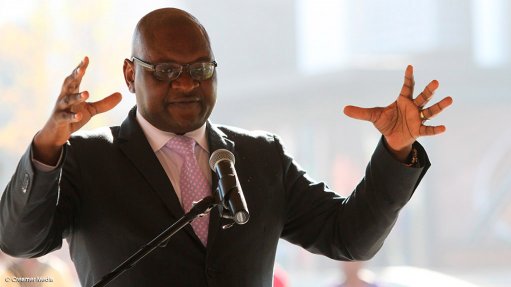
Gauteng Premier David Makhura
Photo by: Duane Daws
While Africa may well be the current “centre of gravity” in terms of future prospects, the opportunities and prospects available must not be romanticised amid major challenges that are yet to be overcome.
Africa has emerged as a pillar of growth and a leading emerging market – while major global economies suffer economic turmoil – registering a 3.6% average growth last year, surpassing global growth of 3.1% and double that of Europe.
“There is no doubt that ours is a continent of growth – a continent of hope, a continent on the rise. The Africa Rising narrative emerged from concrete evidence that our continent is making tremendous progress,” said Gauteng Premier David Makhura on Friday.
Addressing delegates at global law firm Hogan Lovells’ inaugural Africa Forum, in Sandton, he said the continent’s growth was set to continue to remain strong in the next few years, making Africa the “continent of the future”.
“This is Africa’s century. Any business that is sleeping will miss the reality that Africa is the place to be,” Makhura commented.
However, Africans must resist the temptation to romanticise the continent’s prospects, with many challenges still ahead.
“We need to push ahead with interventions in areas such as building sound and enduring institutions; building infrastructure; promoting economic integration; driving industrialisation and innovation; promoting greater levels of intra-Africa trade and ensuring that growth is inclusive and shared among all citizens of the continent,” he stressed.
Only inclusive growth and shared prosperity will enable Africa to leverage its abundant natural resources and its young, energised and entrepreneurial population in a market of more than one-billion citizens.
The continent needs to focus on the integration of its economies and markets, bolstering regional trade and investment, expanding access to funding and regional markets, strengthening infrastructure development and encouraging innovation.
Meanwhile, owing to Gauteng’s strategic position, size and output, Makhura believed the Gauteng City Region had a greater, more constructive and direct role to play in shaping the continent’s prospects.
“Over many decades, Gauteng has evolved from essentially being a gold mining region into South Africa's economic engine, as well as Africa’s financial, industrial and professional services hub and technological nerve centre,” he explained.
Gauteng contributes 35% to South Africa’s and between 8% and 10% to Africa’s gross domestic product and accounts for 42% of South Africa's industrial output and 63% of its exports.
Further, about 43% of South African small, medium-sized and microenterprises and 80% of transnational or multinational corporations doing business in Africa are located in Gauteng.
“Gauteng’s proposition as a gateway to the African continent is based on the fact that, currently, more than 61% of our exports to the continent are destined to countries in the Southern African region, 11.7% to East Africa, 9.4% to West Africa and 11.2% to Central Africa.
“Our ultimate goal is to strengthen two-way balanced trade between Gauteng and all major economies on our continent,” Makhura added.